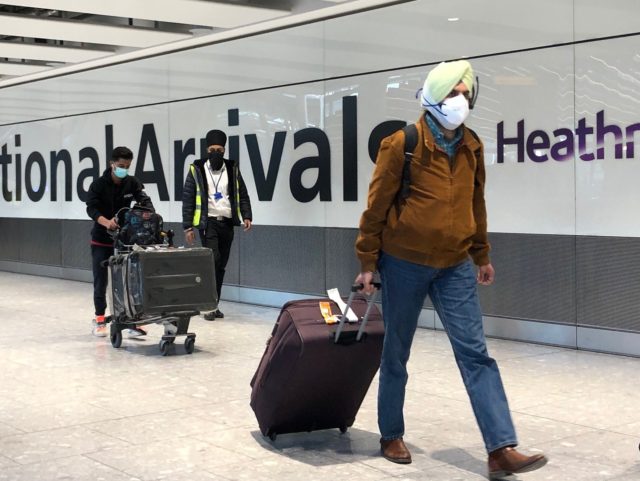Prime Minister Boris Johnson’s borders policies have allowed at least 20,000 travellers from India to enter the country despite concerns over the novel variant of the coronavirus there.
While government officials have denied that the surge in cases of the Indian variant will derail the phase three partial reopening of the country on Monday, the possibility of delaying the final stage of lifting lockdown restrictions in June has been floated if any coronavirus variants are determined to threaten a possible resurgence of hospitalizations and deaths.
Analysis conducted on figures from the Civil Aviation Authority by the Sunday Times suggests that 900 people arrived in Britain from India per day between April 2nd and April 23rd, when the government finally placed the country on the “red list” of travel-restricted countries.
In contrast, Pakistan and Bangladesh were both placed on the red list on April 2nd amid concerns about the outbreak of coronavirus variants.
Allegations have been made that Prime Minister Boris Johnson delayed restricting travel from India because he hoped to travel to the former British colony to sign a post-Brexit trade deal with Prime Minister Narendra Modi on April 25th — a trip which was ultimately cancelled.
Speaking to the paper, an alleged government source claimed: “It’s very clear that we should have closed the border to India earlier and that Boris did not do so because he didn’t want to offend Modi.”
Downing Street denied that diplomatic or trade relations were a motivating factor in delaying the red list designation.
A government spokesman noted that there were three different variants present in India, and the one which has raised concerns was only identified six days prior to the government’s decision to ban travel.
Boris Johnson’s policies on international travel have come under fire from the beginning of the Chinese coronavirus crisis last year, when over 100,000 people continued to pour in through the island nation’s airports per week without being subjected to health checks during the initial nationwide lockdown.
As Mr Johnson locked down the country in March of last year, Brexit leader Nigel Farage lamented that it was “too late”, writing: “So we are to be locked down — and a new testing regime will begin. Will the planes keep coming from Milan, Tehran, and Beijing? I expect so. It’s all too late.”
Starting on Monday, Briton’s will finally be allowed to travel internationally, as well as also be permitted to dine indoors at pubs and restaurants. The mixing of different households and limited openings of theatres, sports stadiums, and music venues will also be allowed under the ‘phase three’ reopening.
Appearing on Sky’s Sophy Ridge on Sunday programme, Health Secretary Matt Hancock said that there is a “high degree of confidence” that vaccines will protect people against the Indian variant of the coronavirus — but warned that the new strain could spread like “wildfire” among unvaccinated people.
Hancock said that currently there are no plans to alter the reopening roadmap, however, he did warn that ministers will reevaluate the situation prior to June 14th when restrictions are supposedly going to be lifted in full.
At a Downing Street briefing on Friday, Boris Johnson said: “I have to level with you that this new variant could pose a serious disruption to our progress and could make it more difficult to move to step four in June. And I must stress that we will do whatever it takes to keep the public safe.”
Professor John Edmunds, a member of the government’s Scientific Advisory Group for Emergencies (SAGE), which has been spearheading the response to the coronavirus, told the BBC’s Andrew Marr programme that people should be “concerned but not panicking” about the new variant of the virus.
“We are in a much, much better position than we were when the Kent variant started spreading,” he said, pointing to hospitals having few Covid patients and the vaccine programme now being in place.
Follow Kurt Zindulka on Twitter here @KurtZindulka

COMMENTS
Please let us know if you're having issues with commenting.